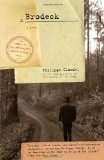Summary | Excerpt | Reading Guide | Reviews | Beyond the Book | Readalikes | Genres & Themes | Author Bio

A Novel
by Phillipe ClaudelI
I'm Brodeck and I had nothing to do with it.
I insist on that. I want everyone to know.
I had no part in it, and once I learned what had happened, I would have preferred never to mention it again, I would have liked to bind my memory fast and keep it that way, as subdued and still as a weasel in an iron trap.
But the others forced me. "You know how to write," they said. "You've been to the University." I replied that my studies hadn't amounted to much--I hadn't even finished my courses and didn't remember much about them. They didn't want to hear it. "You know how to write, you know about words and how to use them, you know how they can say things. That's what we need. We can't do it ourselves. We'd get into a muddle, but you, you'll say it right, and people will believe you. Besides, you've got the typewriter."
It's very old, the typewriter. Several of its keys are broken, and I have nothing to repair it with. It's capricious. It's worn out. Sometimes, for no apparent reason, it jams, as though suddenly balking. But I said nothing about any of that, because I had no desire to end up like the Anderer.
Don't ask me his name--no one ever knew it. Very quickly, people coined some expressions in dialect and started applying them to him: Vollauga, literally "Full Eyes" (because his bulged a bit); De Murmelner, "the Whisperer" (because he spoke very little, and always in a small voice that sounded like a breath); Mondlich, "Moony" (because he seemed to be among us but not of us); Gekamdorhin, "Came from over There."
To me, however, he was always De Anderer, "the Other." Maybe I thought of him that way because not only had he arrived out of nowhere but he was also different, and being different was a condition I was quite familiar with; sometimes, I must admit, I had the feeling that--in a way--he was me.
As for his real name, none of us ever asked him what it was, except the mayor, perhaps, and then only once, and in any case I don't believe he received an answer. Now we'll never know. It's too late, and no doubt better that way. The truth can gash you so deeply that you can't live with the wounds any longer, and for most of us, what we want to do is live. As painlessly as possible. It's only human. I'm certain you'd be like us if you'd known the war and what it did here, and above all what followed the war, what those weeks and months were like, particularly the last of them, the period when that fellow arrived in our village and settled here, just like that, from one day to the next. Why our village? There are dozens and dozens of villages in the foothills of the mountains, lying amid forests like eggs in nests, and many of those villages are a lot like this one. Why did he choose precisely our village, so far from everything, so utterly remote?
When they informed me that they wanted me to write the Report, we were all at Schloss's inn. It was about three months ago, right after... right after... I don't know what to call it. The event? The drama? The incident? Or maybe the Ereignies. Ereignies is a curious word, full of mists and ghosts; it means, more or less, "the thing that happened." Maybe the best way to say that is with a word taken from the local dialect, which is a language without being one, and which is perfectly wedded to the skin, the breath, and the souls of those who live here. Ereignies, a word to describe the indescribable. Yes, I shall call it the Ereigni‘s.
So the Ereignies had just taken place. With the exception of two or three ancient villagers who had stayed home, close to their stoves, as well as Father Peiper, who was no doubt sleeping off his liquor somewhere in his little church, all the men were at the inn, which is like a great cave, rather dark, and suffused with tobacco fumes and smoke from the hearth; and the men, all of them, were dazed and stunned by what had just happened, yet at the same time--how shall I say it? --relieved, because clearly, one way or the other, it had been necessary to resolve the situation. You see, they could bear it no longer.
Excerpted from Brodeck by Philippe Claudel Copyright © 2009 by Philippe Claudel. Excerpted by permission of Nan A. Talese, a division of Random House, Inc. All rights reserved. No part of this excerpt may be reproduced or reprinted without permission in writing from the publisher.
Your guide toexceptional books
BookBrowse seeks out and recommends the best in contemporary fiction and nonfiction—books that not only engage and entertain but also deepen our understanding of ourselves and the world around us.